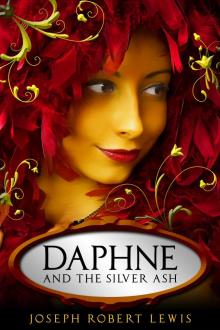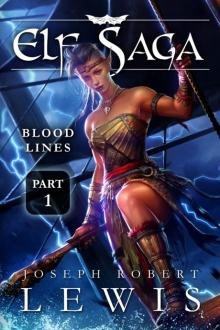- Home
- Joseph Robert Lewis
Chimera The Complete Duet Page 8
Chimera The Complete Duet Read online
Page 8
The nun stroked her mongoose’s head and smiled. “That was fast.”
Asha shrugged and stretched. “Life is short, or so I’m told.”
“For some more than others.” Priya offered her a cool cup of tea. “Will we be staying a while longer to study the local wildlife, or will we be moving on to a certain nearby temple?”
“Not yet,” Asha said. “There’s something I need to do, something I need to check. I’m going out on the lake again.”
“I thought you already looked. Or listened, as it were.”
“Maybe not enough.” Asha untied the second boat and paddled out across the sparkling waters of the lake. She leaned down to place her right ear near the water and closed her eyes, but this time she went on paddling, driving the boat back and forth across the lake again and again all day long. But the lake was massive. It took nearly an hour to cross once and return, and she knew that anything swimming in the deep might easily slip past her on her long trips here and there and back again.
Still she paddled and listened. She heard the fish and the grass and the birds and the trees, and as the hours passed she began to wonder if she had really heard the soft bells the night before. It was early in the afternoon when Asha put the paddle down and she lay back in the narrow boat to rest her arms. Cradled in the rocking boat and warmed by the sun, she was slipping into a welcome nap when she heard the bells again. And again, she only heard them in her right ear.
Asha leaned over the side of the boat, staring down into the water at the rocks and sand, at the grass and weeds.
A thin black shape darted past and the bells tinkled louder. Asha grabbed her paddle and propelled the boat forward with a few rough strokes and then leaned down with her nose just touching the water, watching and waiting. The muddy bottom of the lake was very close here with the reeds and trees standing at the water’s edge only a stone’s throw away.
The black shape darted past again and Asha struck. Her hand stabbed down into the lake, her fingers closed, and she drew the snake up out of the water. She held it gently, pressing only as much as she needed to keep it from escaping. With one hand around its throat behind the jaw and the other hand around the end of its tail, she drew it out straight in the glaring sunlight.
It was a scaled snake and not an eel, only a half dozen hand spans long with a narrow head. And it was black. Jet black all over. It glistened as the water ran off its body and every few moments it would give a sharp jerk, trying to whip its tail free.
Asha studied the snake’s head and eyes for a moment, and then shut her own eyes to listen to the bells, the delicate tinkling bells that seemed to be ringing from each and every one of the snake’s scales. With a lump in her throat, she turned her head so she couldn’t see the snake at all and then gave it a sharp squeeze. From the corner of her eye, she saw the bright flash of golden light on the side of the boat and the surface of the water.
She slumped in the bottom of the boat, still holding the snake tightly in both hands. Taking a deep breath, Asha snapped the snake’s neck and tossed the limp body into the front of the boat. For the next hour she sat there, letting the wind and waves carry her back out to the center of the lake while she stared at her hands and feet and did nothing.
Eventually she picked up her paddle and went back to the shore.
7
“It’s a sunsnake,” she said.
Priya and Rama nodded, neither one facing the black shape coiled on the floor in front of them. Asha picked it up again and ran her fingers over its cold scales. “It looks like an ordinary grass snake, but it lives in fresh water. And it’s black, except when it’s scared.”
“It changes color?” Priya asked.
“No. It blinds its enemies with a flash of light, like a lightning bug. Or ten thousand lightning bugs. Or really, like a bolt of lightning.”
Rama nodded. “And the blindness is permanent.”
“No, it isn’t.” Asha watched the tin kettle bubbling on the fire. “It’s just a flash, just like regular lightning. It blinds the predator for a moment, but only a moment, so the sunsnake can escape. But the light does more than blind the eyes. It triggers a reaction in the brain that causes euphoria, even hallucinations.”
Rama covered his sightless eyes with his hand, his lips pressed tightly together.
Priya touched his knee. “You said you saw your wife when you lost your sight that day.”
He nodded quickly.
“But Asha, why hasn’t his sight returned?”
“It did return, didn’t it, Rama?” Asha asked. “But after that first time, you went out looking for the sunsnake again, didn’t you?”
He nodded again. “I just wanted to see my Vina again. I just wanted that moment again. That happiness. That lightness.”
Asha looked down at the little black snake. “How many times?”
“I don’t know. Every day for months. Dozens of times, I suppose. And each time it took longer for my eyes to recover. And then one day, they didn’t.” He took his hand from his face to reveal a serene smile. “But it was all right. I didn’t mind.”
“Because you can still see her, can’t you?” asked Asha. “You have the visions all the time now, don’t you?” She hesitated, and then whispered, “You’re always looking at her.”
Rama nodded. “I’m sorry. I know I was weak. And selfish. And lonely. But that light, that golden light, it gave me everything I wanted. It gave me back my Vina.”
“No, it just gave you a dream to dull the pain.” Asha poured a cup of hot water and then scraped some of the scales and skin from the snake into the cup. “But I can bring you back to the real world, Rama. If that’s what you want. All you have to do is drink this.” She pressed the warm cup into his hand. “Drink this and your eyes will heal and the visions will end and you can come back to live in the real world again.”
He held the cup in his lap, turning it slowly between his hands. “I do want that. I want a real life. I want more nights like last night.” He reached out to her, but Asha did not take his hand. “And I want children. I want to wake up. I do. That’s what I want.” He drank from the cup slowly, sipping the steaming water until it was all gone.
“It will take a little time,” Asha said. “You should probably go to sleep and let the drink work. I think by morning you’ll feel very differently.”
Rama nodded. “Will you stay with me?”
Asha paused. “Yes.”
8
Asha woke before dawn in a gray twilight world. Everything was cold. The air, the blankets, the floor. Slowly, she recalled the rest of the prior evening.
Supper. Talking by the water. Talking about the future.
Priya had excused herself again to visit the children with Jagdish, and Asha had gone to bed early, and alone.
But when Rama lay down beside her and gently wrapped his arm around her waist, she did not push him away. She rested her hand on his and prayed for sleep to come quickly.
Asha sat up and saw Priya still asleep across the room. The mongoose lay balled up in the nun’s hair, his nose resting in one of the pale lotus blossoms on her head. Asha stood and padded across the room to the door. In the shadows, she stumbled over her bag on the floor and heard some of her tools and jars and vials clink and clack in the dark. She stepped over them and out onto the cool grass soaked with the morning dew.
Rama was sitting by the water, hunched forward with his knees pulled up to his chest, his arms folded across his knees.
Asha sat down beside him. “Good morning.”
“Good morning,” he whispered. His eyes were open.
“How do you feel?”
“Different,” he said. “I’m waiting for the sun.”
“Tell me what you see now.”
He shook his head a little. “Not much. Light gray, dark gray. Sky, water, trees. Maybe.”
“That’s good. Just take it slowly.” She leaned closer to him, but he did not look at her.
The eastern sky grew
lighter, gray transforming into soft golds and pinks as the ragged lines of the clouds emerged from the gloom.
“Do you see it?” she asked.
He nodded. “I see it.”
The edge of the sun crept above the edge of the world and the lake flashed with the first bright glares of pink and gold as the clouds blazed softly like frozen fire across the sky.
“I can see the sun,” Rama said softly. “I can see the trees and the water.” He turned his head toward her and a faint smile curled the corner of his mouth. “I can see you, too. You have beautiful eyes.”
Asha smiled at him, but he turned away again to stare at the lake.
“But I can’t see Vina anymore. She’s gone. She’s gone forever now, isn’t she?”
“Yes, she is. But she’s been gone for a long time now, Rama. You’ve been holding on to a memory, to a dream. But this is a new day. A whole new life for you.” She held out her hand to him.
His lip trembled. “But she… I can’t… I can’t live this life anymore, not without her. I’m sorry.” He unfolded his arms to free his hand and she saw the glint of sunlight on the tiny blade as he thrust it into his neck.
“No!”
Asha watched him fall back into the grass. Rama shivered and sputtered as the blood flowed from his throat and mouth, his wide eyes searching the dawn-streaked skies while his hands pawed at the ground. She leapt up and clasped her hands over the wound, squeezing and pressing with all her weight, shouting over and over, “No! Rama, no!”
9
The sun was high in the late morning sky when Priya finally said good-bye to the families who lived by the lake. It had only taken Rama a few seconds to die, and it had only taken a few moments longer for everyone to come running out to see what was happening. Asha tried to remember exactly what had happened, and how, and why, but the thoughts refused to come together in her mind. The only image that materialized was the shape of the little blade. The shape of a steel scalpel.
My scalpel in his hand.
And then there had been the long, cold hours of standing beside the palash tree and watching the women tend to the body, watching the men burn the body, listening to Priya chanting softly, her voice echoing across the cold waters. Asha leaned against the tree and stared up at the fiery orange flowers.
Priya stood beside Asha with Jagdish on her shoulder and her bamboo rod in her hand. “We don’t have to leave right this minute if you’re not ready.”
Asha looked out across the lake at the grebes gliding across the water. “I’m ready now.”
The nun touched Asha’s arm. “It’s all right to grieve.”
“Why would I grieve? He wasn’t mine, not even when we slept together. He was always hers. I didn’t have him before, and I don’t have him now. So his death doesn’t change anything.” Asha began walking away. “It doesn’t change anything at all.”
Chapter 4
The Bitter Fruit
1
Asha strode along the mountain path, only rarely pointing out the odd tree root or rock underfoot. Priya followed a few paces behind with her bamboo rod in hand and the little mongoose Jagdish perched on her shoulder. The blind woman never stumbled and never once complained about the pace or the path.
“How much daylight is left?” the nun asked.
“Too little.” Asha poked a sliver of ginger into the corner of her mouth and began chewing. “We may not reach the next village before nightfall. I’ll try to find someplace sheltered from the wind for us to sleep.”
They walked on. Asha minded the setting sun as she followed the path down the rocky hillside into the forest. Brittle brown leaves crunched softly underfoot as the fading daylight filtered through the yellow and crimson leaves overhead. Few scents remained to tell of the summer bounty and now the forest smelled only faintly of earth and decay, laced with the light fragrance of the white lotuses blooming in Priya’s hair.
“Asha?” The nun petted the mongoose on her shoulder as she swept the path ahead with her bamboo rod. “If you had a glass of water, and the level of the water was half the height of the glass, how would you describe the glass?”
“Half empty.” The herbalist glanced back. “Is that supposed to tell you something about me? That I only see the negative, the void, the failing, the disappointments in life?”
The nun nodded. “When we ask that question of children, yes. But I already know that you are a pessimist. I asked the question for a different reason. I wanted to point out to you the great deception of the mind, the deception of western philosophy.”
“And what deception is that?”
“The illusion of duality,” Priya said. “It’s a natural error, but the rise of the Ahura Mazdan Temple in the west has spread it far and wide, as far as my temple in Kolkata and probably your family’s home in Kathmandu. The Mazdans see the world in terms of opposites. Creator and destroyer, light and darkness, good and evil. They’ve been teaching this philosophy since I was young, and now it is common for people everywhere to see the world in such terms. Large and small, hot and cold, young and old. Everything must be labeled such, everything must choose a side, as though the entire universe were preparing for a great war.”
“Your point?” Asha continued down the path, deeper into the forest, deeper into the shadows. The air grew steadily cooler.
“My point is that there is another way to see the world. A better way.”
“Then how do you answer the question? If the glass is not half empty or half full, then what is it?”
Priya smiled. “The glass is larger than amount of water it holds.”
Asha sighed. “It’s the same thing.”
“No, it isn’t. When you say that the glass is half empty, as you did, you are focusing on the half without water and ignoring the half that is full. But if you say the glass is half full, you make the same error, ignoring the half that is empty. If you are to see the world as it truly is, then you must see both halves of the glass at the same time, both empty and full. Thus, to describe the glass properly, you must describe all of it at once, which is to say that the glass is larger than its contents. Do you see the difference?”
Asha ducked under a tree branch. “Is that really better? I mean, who cares about the glass? The whole point of the glass is the water. Without any water, the glass is useless.”
Priya stopped abruptly, frowning. Then she ducked under the tree branch and continued on. “I’m just offering you another way to look at the world. A way that isn’t tied to your own feelings, a way of thinking outside the self. Dispassionate. Open-minded. I worry about you. If you spend your life only seeing the darkness, you may come to believe that darkness is all that exists.”
Asha pushed through a curtain of leaves hanging across the trail and saw two small houses in the distance, two little mud and wood shacks leaning into the shadows by the side of the path.
“Houses,” she said softly.
The left shack’s window and door gaped dark and vacant. One wall had lost several planks and the thatching on the roof was perilously thin, revealing the timbers. The right one stood in better repair, though still crumbling from neglect, and it had a tattered cloth hanging across the window and the doorway as well.
“Can you describe these houses?” the nun asked.
Asha heard a dry cough inside the house on the right. She heard nothing from the house on the left. She shrugged and said, “Half empty.”
2
Asha approached the curtained doorway slowly, calling out, “Hello? Is there someone here?” No one answered. She looked around the path and the empty house across the way, but there was no sign of anyone else around. Priya shook her head. “I don’t hear anything.”
Asha cocked her head and closed her eyes. She listened with her right ear, listening to the soft music of all living things, the harmonies of plant and animal and human souls. She heard the shushing and sighing of the trees and the frenetic buzzing of the forest’s ants and beetles, and even a few birds and
snakes, some of them far away. And from inside the house she heard the beating of human hearts, the gentle tides of warm blood flowing through aged bodies, the faint humming of human souls only barely alive and barely aware.
“Someone’s here.” Asha drew back the curtain in the doorway and leaned inside. She saw six bodies lying on the floor, all resting peacefully on their backs or sides, eyes closed, chests rising and falling with an almost invisible rhythm.
“How many?” Priya asked.
“Six. All alive, but…” Asha stepped inside and knelt beside the first person, an old man with skin so dry and shriveled it felt like tree bark. He was cool to the touch. Moving on, she found them all the same. All elderly, frail, rough, and cool.
“Are they dying? Is it a disease?” the nun asked.
“I’ve never seen anything quite like it,” Asha said as she inspected the last body. “They don’t seem ill, just very old. Close to death, really.” She set her bag on the floor and rummaged through it for her tools. She pulled out a small mirror and held it over a woman’s mouth and watched the tiny plume of fog form on the glass. “Barely breathing, but the lungs are dry. Weak pulses, but steady. They may not be able to wake up. Too weak to move, no way to feed themselves. They’ll die soon.”
“How strange. Is there no one caring for them?”
Asha looked around the shadowed room. She saw six bodies in tattered clothes, each one covered by a moth-eaten blanket, each of their heads near the center of the room where a cracked and stained wooden bowl sat. The bowl was empty. “I don’t know. Maybe someone else lives here, someone younger who takes care of them. A nurse or a monk or a child. Maybe they’ve gone out for food.”
“What should we do?”
Asha glanced out the window. “It’s late. We’ll stay the night here and look after these people. Hopefully their caretaker will come back soon and then we can ask about their condition. Maybe I can help. Maybe not.”
They shared an apple for supper and then the two women and their little mongoose curled up in the corner of the room and fell asleep.

 Daphne and the Silver Ash: A Fairy Tale
Daphne and the Silver Ash: A Fairy Tale_preview.jpg) Wreck of the Frost Finch (Aetherium, Book 0 of 7)
Wreck of the Frost Finch (Aetherium, Book 0 of 7) Chimera The Complete Duet
Chimera The Complete Duet Elf Saga: Bloodlines (Part 1: Curse of the Jaguar)
Elf Saga: Bloodlines (Part 1: Curse of the Jaguar) Freya the Huntress (Europa #2: A Dark Fantasy)
Freya the Huntress (Europa #2: A Dark Fantasy) Chimera esd-7
Chimera esd-7 Halcyon est-1
Halcyon est-1 Europa
Europa The Dragon and the Lotus (Chimera #1)
The Dragon and the Lotus (Chimera #1) Halcyon (The Complete Trilogy)
Halcyon (The Complete Trilogy) Ultraviolet
Ultraviolet Wren the Fox Witch es-6
Wren the Fox Witch es-6 Wren the Fox Witch (Europa #3: A Dark Fantasy)
Wren the Fox Witch (Europa #3: A Dark Fantasy) Omar the Immortal es-4
Omar the Immortal es-4 Aetherium (Omnibus Edition)
Aetherium (Omnibus Edition) Freya the Huntress es-5
Freya the Huntress es-5